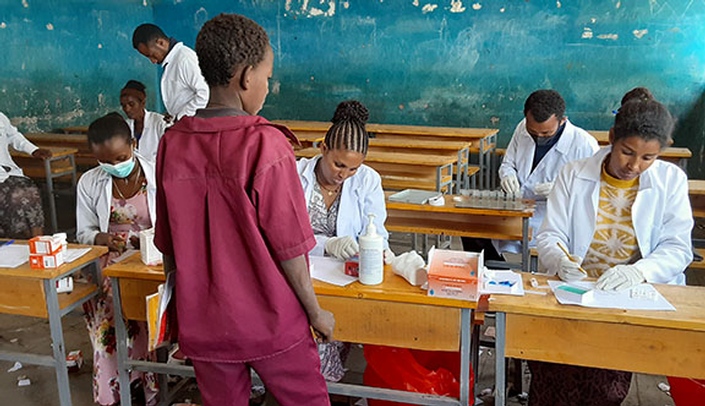Abraham Mengist, PhD, an assistant professor of epidemiology in the UNMC College of Public Health, is continuing data collection in Ethiopia as part of a two-year malaria project.
The project is a collaboration with researchers from Addis Ababa University to investigate the impact of repeated deworming treatment on the epidemiology and clinical outcomes of malaria, anemia, undernutrition and academic performance of children.
Dr. Mengist, a native of Bahir Dar, Ethiopia, joined UNMC in 2019. He received his master’s degree in biology/biomedical sciences from Addis Ababa University in 2008; he later received a doctorate in public health/epidemiology from Florida International University in 2019.
When Dr. Mengist came to UNMC, he listed malaria — its diagnosis, treatment and epidemiology — among his leading research interests.
Dr. Mengist said his interest in research on the epidemiology of malaria and helminth, or worm, infection resulted from his desire to help his fellow Saharan people. Malaria and helminth infections are major public health problems in most sub-Saharan African (SSA) countries, including Ethiopia, he said.
“As an academic, I believe I should be part of the solution to preventable public health problems,” Dr. Mengist said then. “As a native of the SSA region, I feel compelled to help my society thrive in terms of improving their overall health.
“I aim to achieve this by conducting epidemiological research that can change clinical practices and policies useful to control diseases.”
Dr. Mengist said that in the malaria research study in Ethiopia, researchers are conducting a randomized trial among school children, in which some are treated with Albendazole and Praziquantel and others with a single dose of vitamin C every four months for two consecutive years.
The study, he said, will generate data to inform strategies for controlling and preventing malaria and helminthiasis and related adverse health outcomes in regions where the two diseases are co-endemic.

Good to hear about your work in East Africa!